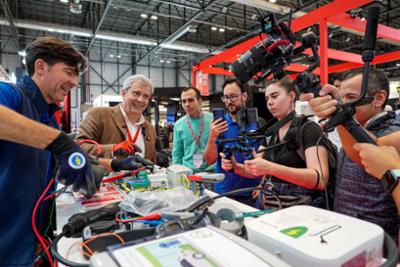

On the third day of MATELEC, the focus is on decarbonisation and the modernisation of electrical installations
It also included discussions on product digitalisation, energy efficiency policies and innovations in lighting and illumination.
On the third day of MATELEC, the International Trade Fair for the Electrical and Electronics Industry, new solutions were presented for the sector in a context marked by energy transition and the need to modernise electrical systems and infrastructures. The fair, which is held at the same time as Semana Internacional de la Construcción (International Construction Week) - CONSTRUTEC, VETECO, SMART DOORS and PISCIMAD -, will continue until Friday, 8 November in halls 4, 6 and 8 of IFEMA MADRID.
The Observatory for Electrical Rehabilitation of Housing in Spain (OREVE) was a key event of the day, featuring an open debate between several OREVE organisations on the results of the recently published report, 'The decarbonisation of the residential sector in Spain: the role of the electrical installation'.
The roundtable was moderated by Óscar Quero, General Manager of AFME, who highlighted “the fundamental role of electrical installations in decarbonisation, noting that their contribution is currently overlooked in current policies.” He highlighted the OREVE's objective of raising awareness of the necessity to prepare homes for current and future electricity consumption, emphasising that “without modern installations, households cannot meet climate targets”. In this regard, Querol emphasises that the report offers insights into the present role of electrical installations in the home, with a view to informing future actions.
In terms of policy, Marta Sanromán, director general of AFEC, highlighted “the need for a National Electrification Plan that promotes modern grids and sustainable technologies”, despite the existence of instruments such as the Recovery Funds or the Energy Efficiency Directive. Fernando Prieto, president of ANERR, identified several structural barriers that impede refurbishment efforts. These include a lack of confidence in aid schemes, slow administrative procedures, and a lack of awareness among owners. He stated: “Despite the fact that 70% of the public believe that their housing is efficient, the reality is that this is not the case.”
In this regard, Ana García Gascó, Director General of CONAIF, highlighted the need for upgrading electrical installations in Spain, where 40% of homes were built between 1960 and 1980 with obsolete electrical standards. “30% of fires in domestic properties are caused by outdated installations. It is essential that we modernise these systems to guarantee safety and facilitate the energy transition," he explained. He drew attention to the Madrid City Council's 'Plan Rehabilita', which includes financial assistance for the renovation of essential electrical infrastructure, such as control panels and wiring.
Pilar Blanco, head of communications at ADIME, commented that “the electrical installation is the backbone of homes and yet it continues to be overlooked in decarbonisation plans.” The report, which was compiled following a survey of over 1,200 homes across various regions of Spain, revealed that 51% of the public and 38% of technicians were unaware of the existing support measures, which has hindered the implementation of improvements.
The report revealed that 13% of renovations are undertaken for energy efficiency purposes, compared to 45% for repairs and 30% for aesthetic considerations. To address this situation, experts at the Matelec Forum identified the need to raise awareness, professionalise electrical assessments and installations in homes and simplify the procedures for accessing subsidies, among other improvements.
In the same space, Secartys facilitated a roundtable discussion with manufacturers and distributors to gain insight into their perspectives on the impact and opportunities of the Digital Product Passport. Together with Jordi Ortiz, CEO of Secartys, the participants explained that this is a digital document that contains all the relevant information about a product throughout its life cycle, including details of the materials and processes used in its manufacture, as well as information on how it can be recycled or disposed of at the end of its useful life.
Furthermore, on this third day, Matelec, in collaboration with AFME, presented the 6th Matelec Innovation and Energy Efficiency Awards, as well as KNX from the Michael Sartor competition. Furthermore, roundtable discussions and presentations reinforced the value of the National Energy Efficiency Certificates (CAEs) system and other initiatives, such as the presentation on the Present and Future of Lighting by ANFALUM and talks sponsored by Sonepar.





